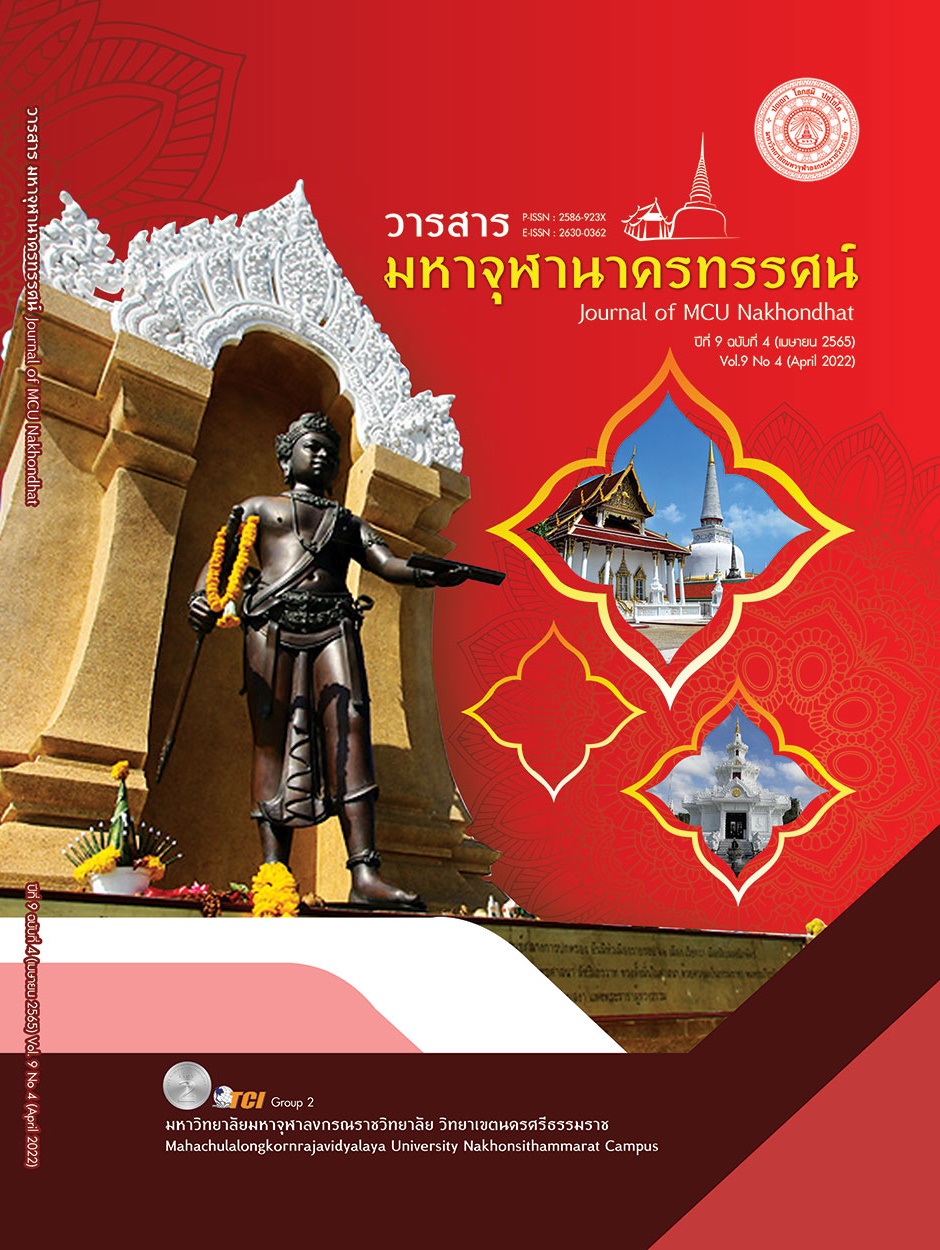COMMUNITY ENTERPRISES DEVELOPMENT FOR ECOTOURISM OF TONNAMKLAY OF PATTHANA VILLAGE NAKHON SI THAMMARAT PROVINCE BASED ON COMMUNITY TOURISM
Main Article Content
Abstract
The objectives of this research are: 1) to study the development of ecotourism community enterprises, Patthana village, Nakhon Si Thammarat province on community-based tourism 2) to study recommendations for community enterprise development by using mixed research method, for qualitative research; a group of 21 key informants collected data using unstructured interviews. for quantitative research, a group of population are 581 people, the sample size amount 237 people. The research instrument was a questionnaire, and data analysis by mean, standard deviation and interpreting the results according to the 5-level evaluation scale and interpreting the mean of the data analysis results. The results showed that. 1. The results of the analysis of community enterprise development data, by including all four aspects, were at the highest level ( = 4.52). from more to less as follows; The aspect of information was at the highest level ( = 4.75). The aspect of management was at the lowest level ( = 4.32) 2. Recommendations for community enterprise development can be divided into 4 aspects: 1) Community enterprise management; A development plan should be prepared with government agencies by writing a community enterprise development plan in the government's development plan. 2) Financial aspects of community enterprises; After adding the development plan to the state roadmap, Projects should be proposed to receive budgets to develop enterprises better, 3) The aspect of production of community enterprises; there should be training and apply technology to help higher products to be more standardized and faster, and 4) The aspect of information of community enterprises; there should expand the customer base to be varieties and should be promoted to enable products to be exported to foreign countries.
Article Details

This work is licensed under a Creative Commons Attribution-NonCommercial-NoDerivatives 4.0 International License.
References
กรมการพัฒนาชุมชน. (2560). แนวทางการจัดตั้งและพัฒนากลุ่มอาชีพ. กรุงเทพมหานคร: สไตล์ครีเอทีฟเฮ้าส์.
กุสุมา ภูเสตว์. (2553). การประชาสัมพันธ์เพื่อสร้างการมีส่วนร่วมของชุมชนในการส่งเสริมการท่องเที่ยวเชิงวัฒนธรรม. ใน รายงานวิจัย. จุฬาลงกรณ์มหาวิทยาลัย.
คณิดา ไกรสันติ และรัสมนต์ คำศรี. (2559). แนวทางการพัฒนาศักยภาพกลุ่มวิสาหกิจชุมชนสุชาวดี ตำบลปริก อำเภอสะเดา จังหวัดสงขลา. ใน การประชุมาหดใหญ่วิชาการระดับชาติ และนานาชาติ ครั้งที่ 7 วันที่ 23 มิถุนายน 2559. มหาวิทยาลัยหาดใหญ่.
จินตนา กาญจนวิสุทธิ์. (2558). เส้นทางวิสาหกิจชุมชนเพื่อการพัฒนาอาชีพและการพึ่งตนเอง. กรุงเทพมหานคร: มีน เซอร์วิส ซัพพลาย.
ธงพล พรหมสาขา ณ สกลนคร. (2556). แนวทางการพัฒนาการดำเนินงานของวิสาหกิจชุมชนในเขตลุ่มทะเลสาบสงขลา. ใน รายงานการวิจัย. มหาวิทยาลัยสงขลานครินทร์.
ธนาคาร เรืองศิลป์สุวิทย์. (2549). การดำเนินงานวิสาหกิจชุมชน กลุ่มผลิตภัณฑ์จักรสาน ในจังหวัดเชียงใหม่. ใน รายงสนการวิจัย. มหาวิทยาลัยเชียงใหม่.
บานชื่น นักการเรียน และคณะ. (2562). ผู้นำทางการเมืองเชิงพุทธ. วารสารสิรินธรปริทรรศน์, 20(1), 30-36.
พชรพร วงษ์วาน. (2563). แนวทางการบริหารการพัฒนาวิสาหกิจชุมชนสู่ความสำเร็จอย่างยั่งยืนของ จังหวัดเพชรบุรี. วารสารบัณฑิตวิทยาลัย มหาวิทยาลัยราชภัฏจันทรเกษม, 15(1), 100-111.
ศรัณย์ ฐิตารีย์ และสุรศักดิ์ โตประสี. (2560). การจัดการการท่องเที่ยวเชิงอนุรักษ์ขององค์การบริหารส่วนตำบลบางน้ำผึ้ง จังหวัดสมุทรปราการ. วารสารสารสนเทศ, 10(1), 141-150.
ศิริรัตน์ พุมดวง. (2564). วิสาหกิจชุมชนท่องเที่ยวเชิงอนุรักษ์ต้นน้ำกลาย. เรียกใช้เมื่อ 3 มกราคม 2564 จาก https://www.provincialchamp.com/2019/shop/62143
สำนักงานเลขานุการคณะกรรมการส่งเสริมวิสาหกิจชุมชน. (2548). วิสาหกิจชุมชน. กรุงเทพมหานคร: กรมส่งเสริมการเกษตร.
เสรี พงศ์พิศ. (2552). คู่มือทำวิสาหกิจชุมชน. กรุงเทพมหานคร: พลังปัญญา.
Yamane, T. (1967). Statistics,: Aa Introductory Analysis. New York: Harpet and Row.


